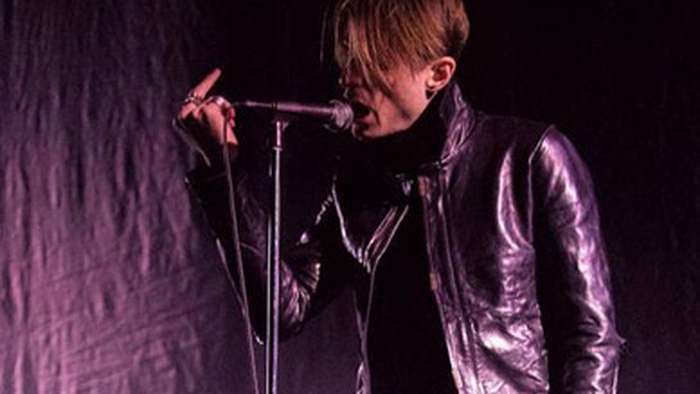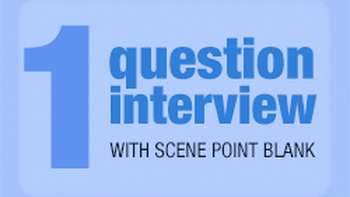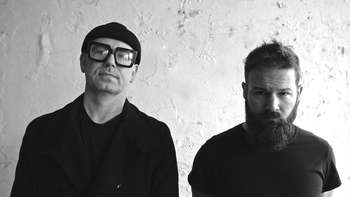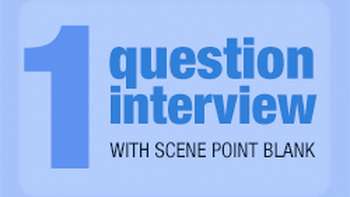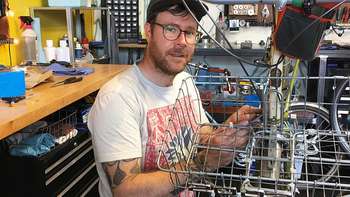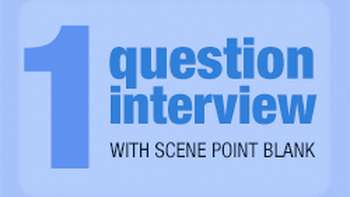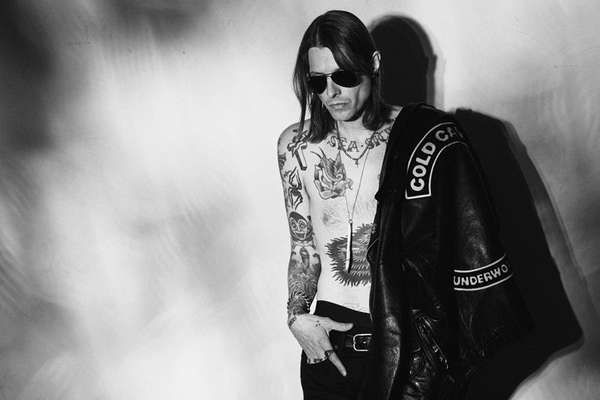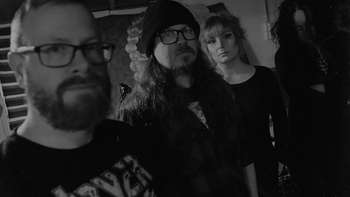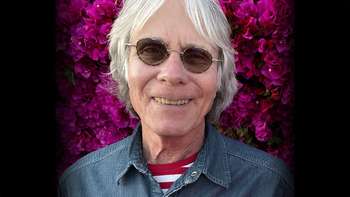I enter a boutique hotel in the East London borough of Shoreditch and I'm immediately approached by overly friendly staff and cautious security guards. They give me the once over then politely ask for my room number. When I tell them I don't have a room, they ask what business I have at their hotel. Everyone's courteous, sure, but it's clear from their response that with my traveler's beard and unkempt hair the staff are all asking: What is this guy doing here?
I explain that I have an interview Wes Eisold, the lead singer of Cold Cave and American Nightmare, and receive blank stares.
"He's a patron at the hotel," I say. Nothing.
"Um, he's opening for Nine Inch Nails at the O2 arena tomorrow." And with that someone shows me to the lounge. I get an espresso and wait.
It's strange to me that I need Nine Inch Nails to contextualize Wes. He's been one of my favourite lyricists for years and among a certain sect of twenty-somethings, myself included, he's achieved the status of cult hero. Intellectually, I can totally understand why these people wouldn't know about the abrasive hardcore singer turned enigmatic synth-rocker, but on a personal level it seems kind of ridiculous.
My palms start to sweat. I've had too much caffeine and I nervously look over my questions again. I've interviewed bands since I was a teenager, and I've been lucky enough to meet dozens of my idols, but for Wes I'm nervous. Most articles I've read have characterized the singer as misanthropic and sullen. They also tend to focus on his missing hand, something Wes has lived with since birth, or the minor scandal created over Fallout Boy appropriating his lyrics for their multi-platinum album From Under the Cork Tree. More recently the press has talked about the singer's newfound sobriety after a candid interview with Consequence of Sound where Wes talked openly talked about his harrowing struggle with addiction. There's also his literary press and former bookstores, his military-kid upbringing, and the numerous bands he's played with aside from American Nightmare and Cold Cave. And it's true that I want to know about all of these things, certainly, but more than any of that I want Wes to like me. It's a terrible position to be in as an interviewer.
I've listened to one of Eisold's bands at least once a week for the better part of a decade. For me, American Nightmare redefined what I thought hardcore could be and served as a gateway to bands such as Refused and Converge, which subsequently redefined what I thought music could be. Wes' lyrics backed by the melodic brutality of his band hit me in a way that most music hadn't. It was as though I had finally found something that matched the pace of my own thoughts. When American Nightmare broke up I continued to follow Eisold's artistic output, and while his current project Cold Cave is a far cry from what initially drew me to his work, Wes' tracks of nihilistic poetry to gothic post-punk beats appeal to my sensibilities on entirely different level. Simply put, I'm a fan.
If my entrance into the lobby attracted attention, Wes' entrance commands it. He's tall and thin, dressed all in black: drop crotch sweatpants, a leather jacket with the collar up, and sunglasses indoors. It's a good look. I know this because I am also dressed in all black and also happen to be wearing sunglasses indoors. The patrons of the lobby all give him the once over, and it's immediately clear he's the coolest person in the place. Wes, for his part, seems unaware or indifferent to all this attention as he walks out the hotel's doors. I contain my fanboy urge to freak out, and go outside to introduce myself while he smokes a cigarette.
It's hard to gage how much you can really know about a person after chatting with them for a half an hour, but by my account I don't understand the reputation Wes has earned for himself. He's undeniably aloof, but as we shoot the shit about London's art scene and our mutual love for Marc Maron's WTF Podcast, the conversation flows easily enough. Wes is smart and curious. He even offers advice about what to see while I'm in town. It’s only when I start my pre-planned questions that things get a little rocky.
It's not that Wes is extremely famous, or that he's the type of artist who gets hounded or followed around by obsessive types, but when I bring up the exposure he's gained through an arena tour with one of alt rock's biggest bands or the praise he's received from numerous critics he seems…I don't think uncomfortable is right word. Perplexed, maybe. Not by the question, but the idea that a mass audience could accept what he has to do. It's a similar response when I ask about how he ended up on the tour in the first place and from there things are a bit awkward.
I can see why other writers might take these response as depressive or misanthropic. Those labels fit with Wes' art and it’s not a difficult leap to assume that because he makes dark, atmospheric music, that he must fit the mold of the tortured artist. But for my part what I took away from our conversation wasn't hate--for other humans or himself. It was a man trying to come to terms with success that's built out of his own struggles with self-worth, and that's not the same as someone who is depressed.
The tour with Nine Inch Nails came about because Trent asked him, but the comparisons with Nine Inch Nails can go beyond the fact that they’re touring together. Wes is newly sober, in a solid romantic relationship with collaborator Amy Lee, and recently began a workout regime. He's working on new material that maintains the same intensity as his previous projects while venturing into somewhat new territory lyrically. I can't help but think Trent recognized these things, and that's what caused him to invite Cold Cave on tour. In my head they have a mentor type relationship with one another, but it's entirely possible that I'm reading too much into it and, in truth, I was too afraid to ask. Either way, I can't help but thinking that despite everything that's gone on, the man seems sure of himself, and I'd go as far to say that he's happy.
Before I know it, I've asked the first round of questions and there is a brief silence while I look down at my notepad, wondering if I can muster up the courage to ask the second round. It's all the difficult and personal stuff, and I'm questioning whether or not it's appropriate to talk about with a stranger, especially a stranger I admire. It's an odd moment. I decide that the best course of action is to quit while I'm still kind of ahead. I thank Wes for his time, he smiles and thanks me back. As we standing there I realize people are still looking at us. Wes still doesn't notice, or doesn't care, but I'm filled with admiration that we're being associated together. I hope I'm right about all the assumptions, but who knows.
Below is a transcript of our talk.
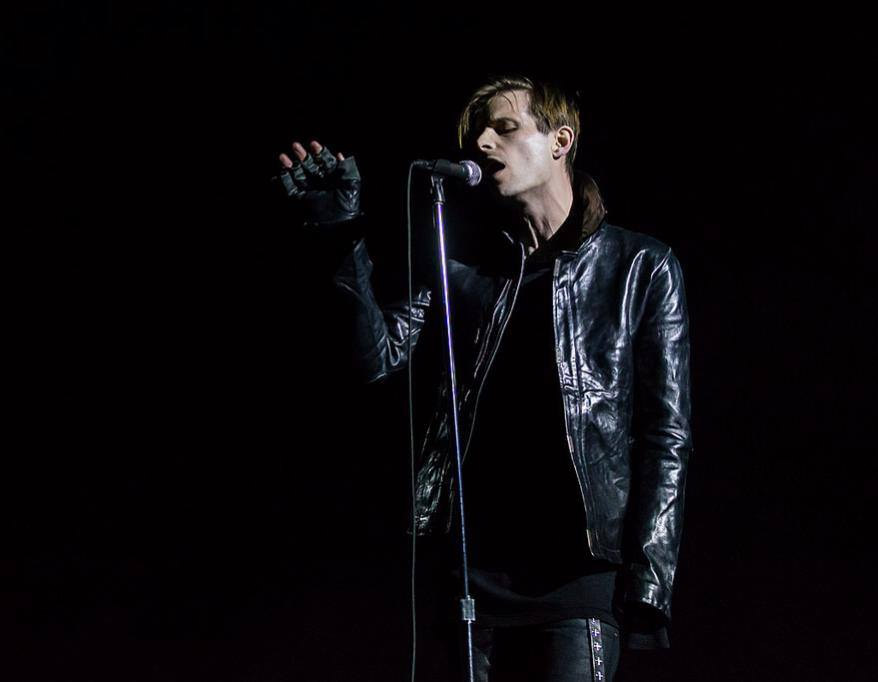
Photo by Johanes Andersen
Scene Point Blank: I was really excited to hear you were touring with Nine INch Nails. Can you tell me a little bit about that experience? How did the tour come about?
Wes Eisold: It happened in a really organic way. I got an email from Trent asking us to tour. I don't even have a European agent. He just contacted me directly. I think people tend to think in certain situations, when you're playing with bands like that, that there are a lot of politics involved with labels or agents or managers, and there probably is that aspect of it with other bands…but pretty much, for me, anything that's happened like that has been because someone has contacted me and asked me to do it. That's kind of where I'm at right now, too. I'm not working with that many people. I'm doing what I want to do, and if things happen for me than that's great but I'd be doing it regardless.
Scene Point Blank: Playing stadiums has got to be a lot different than playing shows on your own.
Wes Eisold: The biggest difference is you're playing to people who don't know you. They want a rock show. They don't know who you are. People are instantly against you. I think people expect you to try and prove yourself to them. I don't really operate that way or take that into consideration. It's a challenge and it's interesting to play to that many people. It's exhilarating sometimes, but some of the coolest parts are when you're pulling up to these massive venues or when you're walking on to the stage. Once you're there it's kind of the same as your own show, just a little bit more awkward because of the reactions from the crown, from being judged.
Scene Point Blank: Do you feel like it was a similar experience when you played your shows in China?
Wes Eisold: In a way, yeah. People there were coming to the shows and they didn't even know the band. With the Nine Inch Nails shows the fans are just waiting for the headliner or checking something out. They have similarities, but the reactions to the shows in China were so bizarre. People would just stare at you. I don't think electronic music has really broke there in general. We were immediately different. We played some festivals and we had to play at the acoustic stage because we're two people. Two people can't play on the main stage because the main stage is for full bands.
Scene Point Blank: That's so weird.
Wes Eisold: It was so backwards. You're two people so you play this stage. You can't play the main stage because it's for five people or at least four people. That whole trip was crazy. We had to submit lyrics and songs to the Chinese government to be okayed to be Chinese government to be able to perform at festivals.
Scene Point Blank: Seriously?
Wes Eisold: Yeah. People that are in bands in China were telling us that often they have to perform their songs live for government officials. Sometimes the officials would even give them pointers on their songs, like suggesting they turn they bass down or something. You can't say anything against the government or you're banned. We played so many shows in China. We played so many cities that I didn't even know the names of. Cities I've never heard of with a higher population than New York. It was all pretty cool.
People that are in bands in China were telling us that often they have to perform their songs live for government officials. Sometimes the officials would even give them pointers on their songs, like suggesting they turn they bass down or something.
Scene Point Blank: The band consistents of just you and Amy nowadays. Tell me about the decision to strip things down after playing with more members before.
Wes Eisold: I tried a lot of different ways and right now I like the minimal approach to it. Being in a band is like being in a relationship with people. I work better in smaller numbers. I think I will have a larger group again in the future, but right now I like playing in a two piece. I like playing with Amy because she gets it. She gets the music. She gets the aesthetic. In the past people were just hired guns in a way, or people I knew. Sometimes it worked, but sometimes they were just playing dress up. They were like, “Okay, I'll wear black clothes on this tour.” I wasn't really into it. It's been interesting playing as a two piece on this tour in particular because people were saying that we couldn't go play arenas as two people. It's two people. You can't do it. The stages are too big. The crowd won't get it. But we're doing it, so you can do it. It's part of the challenge and it's something we wanted to see if we could make work. We're doing it. So it's working.
Scene Point Blank: One of the references I've seen come up a lot to contextualize Cold Cave is the band Suicide. When did you discover that band? Was it around the same time you got into hardcore?
Wes Eisold: I first heard Suicide long before I got into hardcore, just from getting punk comps as a kid, but I think I got back into Suicide around the same time I started experimenting with Cold Cave. The sound influence of Suicide is only on a couple of songs from Cold Cave, but they were encouraging when I wanted to try things out as a two piece as well. I just think they're cool. I think they're the greatest. A lot of people tend to stop with the first record, but all their records are really incredible.
Scene Point Blank: My first experiences with your work was through American Nightmare. I know there are a lot of crossover fans between American Nightmare and Cold Cave, but I also know that a lot of people within the hardcore community can be adverse to trying new things. Is a short-sighted response from the hardcore kids something you're concerned with?
At the beginning I didn't have my name associated with Cold Cave because I didn't want people from outside of hardcore to start judging and with questions about who is this guy from hardcore trying to start an electronic band.
Wes Eisold: I'm not concerned with it, but I am aware of it. But more people from that world have been coming to Cold Cave shows. At the beginning I didn't really announce what Cold Cave was. I didn't have my name associated with it because I didn't want people from outside of hardcore to start judging and with questions about who is this guy from hardcore trying to start an electronic band. I wanted it to stand on its own. I think it took people from hardcore a little while to catch up, and then they didn't like it. Then there were people who liked me, and some of them did like it, or they had trouble with it and thought it was boring or whatever. The last couple of years more people have been coming out. I think people are starting to understand. If you were into American Nightmare or something, or things I was saying or talking about, that's all still there.
Scene Point Blank: Do you consider yourself primarily a musician? Or is the music a vehicle to get your writing and ideas out?
Wes Eisold: I want to say yes to both. I don't ever think about being a musician. I think about being a writer and a singer, and often times forget that I'm the one who wrote the Cold Cave songs. There are times that I have to put myself in the space to remember that I can write music. So do it. Go out and do it. Because I forget that I even can do it. I often just wish that my role was to just to sing, but that's not the case in this band. I wanted to write the music for the challenge and for it to be completely mine. I guess I am a musician by trade. I say that at customs when I go to other countries but I never walk around thinking I'm a musician.
I just wait for worlds to collide and if it happens, it happens.
Scene Point Blank: One of the ventures you've talked about in other interviews is wanting to create hip-hop beats. Am I misquoting you there?
Wes Eisold: No, I would love to do it. I would like to do collaborations at some point in the future. I think a lot of the stuff I've made, that I haven't released, could work for someone.
Scene Point Blank: Is it just a matter of finding the right person?
Wes Eisold: I guess. I never really get a hold of people. I don't like to put myself out there or track people down. I just wait for worlds to collide and if it happens, it happens. But, if not, that's totally okay.
Scene Point Blank: Thanks so much for taking the time to do the interview. Is there anything you'd like to add?
Wes Eisold: Yeah, no problem. No, I don't think so.
